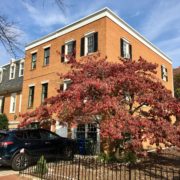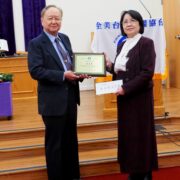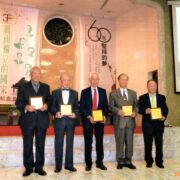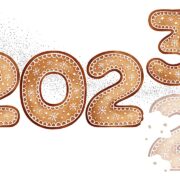The Birth of the Formosan Association for Public Affairs (FAPA)
Since the mass media in Taiwan is monopolized by the Kuomintang (KMT), overseas Taiwanese were planning to set up a radio station outside of Taiwan to broadcast news to Taiwan. After many years of research and discussion, we finally decided to establish a board of directors for the radio station that would be responsible for the funding and future operations of the organization. On January 10th, 1982, the president of the World United Formosans for Independence, Tsan-hung George Chang, wrote a letter to twenty enthusiastic colleagues around the world, inviting them to a meeting in Los Angeles. It was fortunate that just at that time, the U.S. Congress had passed a proposal to admit 20,000 Taiwanese immigrants a year, which everyone felt was greatly encouraging and morale was high. There were some members who suggested that the meeting should include a discussion of how to promote national diplomatic work; among these members, Joshua Yapp was the most insistent. After consulting George Chang, I sent a letter by express mail to Joshua Yapp on January 27th, promising to add the issue of national diplomacy to the meeting agenda.
The meeting was held on February 13th and had 15 people in attendance: Charles Ting, Kenjohn Wang, Ming-an Chou, Ming-che Lin, Chien-hui Hsu, Philip Chen, Tan-Sun (Mark) Chen, Tu Chen, Yu-hsin Kuo, Ming Min Peng, Jen-Tai Tsai, Chia-yu Yang, Tsung-chang Yang (C.C. Yang), Fu-Chen Lo, and myself. First, we discussed the radio program. The majority opinion was that since the island’s counter-KMT magazines were already flourishing, there was no need to set up a radio station to promote democratic ideals to the island. Moreover, the KMT would certainly try to interfere with the broadcast, which would make it very difficult to listen to the station. After one or two hours of discussion, this plan was put on hold, and the remainder of our time was focused on discussing how to establish an organization specifically responsible for national diplomacy issues.
Everyone felt that this organization should not only help Taiwanese on the island, but also protect the rights of Taiwanese living overseas, promoting democracy and freedom for Taiwan, and to prevent the Communists from invading. Thus, we successfully formulated the following objectives for the organization: 1) to cooperate with the democratic forces on the island to promote freedom and democracy for Taiwan; 2) to publicize the determination of the Taiwanese people to pursue democracy and freedom, creating an international environment that supports the self-determination and independence of the Taiwanese people; 3) to protect and promote the rights and interests of overseas Taiwanese communities.
On the morning of the 14th, we discussed whether this organization should be a part of the World Federation of Taiwanese Associations (WFTA) as a diplomatic branch of the WFTA. After discussing, it was decided that we should establish a separate organization. The main considerations that resulted in this decision were: 1) the WFTA Council might not agree with the establishment of a diplomatic group; 2) if the WFTA actively engaged in diplomatic affairs, community members who aren’t interested in participating in politics might hesitate to attend regular WTFA activities. The new organization needed a name, so everyone agreed on adopting the name Taiwanese Association on Public Affairs, or TAOPA for short. When said aloud, it sounds a lot like “help fight” in Taiwanese.
This was a very beautiful name, but some people felt that the grammar was incorrect. After I searched through a number of reference books, I realized after the word “on” after “Association” should be changed to “for.” The acronym in English would thus be TAFPA or TAPA, which doesn’t sound like a word in Taiwanese. On February 17th, I sent out a letter to the meeting participants to point out that the name we had decided upon during the meeting was incorrect, and I proposed that we change it to Formosan Association for Public Affairs, or FAPA for short. When read out loud, it sounds like the Taiwanese phrase “call to fight.” We took a vote, and over two-thirds of the attendees approved of the name.
The meeting was very successful; we discussed the internal structure and operation of the organization, as well as how to fundraise and invite hotels to support our organization’s activities. But once we began discussing elections, the difficulties began. Ming Min Peng, Mark Chen, and I were nominated, but the three of us were all unwilling to serve as president. Ming Min Peng said he lives on the West coast, and he felt the president should be someone who lives on the East coast, since the geographic location would be more convenient. Mark Chen said that since he was already president of the WFTA, he was already too busy, so becoming the president of another organization would be inconvenient for him.
At that time, I was obsessed with my research and had already begun writing a book. I was reluctant to give up on the project halfway, so I refused. Everyone suggested that the three of us go out from the meeting and discuss until we were able to convince one of us to accept the presidentship. After the three of us talked for a long time, we were still unable to come to a conclusion, so we decided to take a break and hoped that we could continue to talk it out over lunch and select someone. After our meal, we still were undecided, and everyone, feeling very helpless, asked us to go outside and discuss again. I felt that even if we kept discussing, the arguments would remain unchanged. If we were unable to select a president, we would not be able to establish the organization, which would be a pity. Therefore, I personally volunteered, agreeing to be nominated as the president. At the same time, I proposed two requirements: firstly, that we establish a member system so that the president can be elected by the members; and secondly, that the elections for the position of president would be held annually. After everyone accepted my conditions, we held a secret ballot, and I was officially elected as president. FAPA was born, and I began taking on the pioneering work of our new organization.
Developing the Organization
Over the years, I have noticed that there are a lot of people in the Taiwanese community who care a lot about Taiwan but, for many different reasons, they have not joined any organizations that actively participate in the Taiwanese self-help movement. It’s such a pity. If we could gather these enthusiastic community members together, the entire movement would be strengthened by the addition of fresh troops. Thus, when I became FAPA president, I realized that this was the best opportunity for me to turn the wish I’d had for so many years into a reality. I not only needed to do the job of national diplomacy well, I also had to create a good organization for Taiwanese people.
To create the organization, we first needed to formulate the organization charter. I felt that since FAPA had just been established, the simpler the charter was, the better. As long as it laid out some of the most basic rules, that was enough; afterwards, depending on how the situation developed, we could make changes. In 1947, the KMT formulated a long constitution with 175 articles. As a result, they were expelled from the Chinese mainland 2 years later. In the first four years when the United States of America was being founded, the constitution only had 7 articles, but the US later became the strongest country in the world. From this we know that the rise and fall of any organizes mostly depends on their actual practices, and that legal articles cannot determine their success or failure. The FAPA charter only has three articles. The first is our mission, which had already passed during the foundation of the organization. The third article includes an explanation of and the procedures for changes the charter, which is found in most charters. The second article is a little more complicated, spelling out the responsibilities, rights, election methods, and term lengths for the members and president.
When FAPA was first established, there were thousands of things to get done. We needed a strong and powerful president to carry out all of the work, so the president needed to be given great power and rights. Article 2.4 stipulates that the president oversees all of the organization’s affairs, including the personnel and finances. The president also holds the power to make decisions on various policies. Since the president has such great power, much caution must be used during the elections for the position of president. In early 1983, I drafted the “Presidential Election Regulations,” which was approved by the committee. The document outlines regulations for the details of the candidate nomination and voting processes, and it has been used to this date to resolve debates that may occur during an election. The president’s term lasts two years, but regardless of the extent of his contributions, he can only be reelected once.
The president is elected by the committee, of which there are forty-one members (this number increased to fifty-one in 1983, and sixty-one in 1985).
The main reason that there were so many people in the committee was that we wanted to gather together enthusiastic Taiwanese from places around the world and bring them under a single system. By holding meetings together and strengthening our mutual understanding, representatives of the global Taiwanese population would be able to respond to Taiwanese emergencies by quickly and effectively discussing and deciding what measures should be taken. Part of the committee is elected by the members of the organization, while the other part of the committee is elected by local elections. This way, those who work quietly and aren’t very well-known locally also have the opportunity to be elected to the committee and to work towards a better future for Taiwan.
FAPA endeavors to collect members of various talents. I invited Ming Min Peng to become honorary president. I also brought the late founder of the Taiwan Youth Association, Ong Iok-tek, the late President of the Overseas League of the Taiwanese Democratic Movement and former Taiwanese legislator, Yu-hsin Kuo, and former chairmen of the World Federation of Taiwanese Associations, Rung-chu Kuo and Chang-hui Huang as consultants. Mark Chen, then-president of the WFTA served as vice-president, President of the Taiwanese Association of America, Tu Chen, was responsible for organizing, and Chamber of Commerce President, Kenjohn Wang, was responsible for finances. Thanks to the hard work of this older generation of leaders, nearly everyone who has served as a leader in any important overseas Taiwanese association has joined FAPA.
The variety of professionals that come from different industries also reflects the inclusivity of FAPA. In 1983, the fifty-one members of the committee can be broken down by profession as follows: 14 commercial workers and businessmen, 13 professors, 11 corporate employees, 6 doctors, and 7 members from other professions. Even businessmen and doctors who had previously participated very little in the activities of Taiwanese associations have also become committee members. I encourage them to use their real names, and every year we publicly announce the names of committee members, showing that this is an honorable and legal organization that has nothing to hide.
The officers of FAPA split up, going off to different places in the world to recruit enthusiastic Taiwanese to join the organization. In early April of 1982, Ming Min Peng and I took a 10-day trip to visit each major city with a Taiwanese population to explain the mission of FAPA and ask for their support. In June of the same year, I bought a discounted plane ticket that allows for 21 days of travel, and I once again went to visit 20 cities. Tu Chen accompanied me while I was on the west coast. I discovered that talking face-to-face with Taiwanese people about Taiwanese issues made it easier to get their support and understanding. Thus, I decided to expand the tour for the next summer. I joined up with Ming Min Peng, Chang-hui Huang, and Long-Chen Chen to disperse across the nation, visiting 51 cities in 21 days. The results were splendid; not only did we attract many new members, but we also raised a lot of money.
In addition, from 1982 to 1983 I went to all of the Taiwanese Summer Conferences to promote FAPA, which caused the number of members to dramatically increase. During that time, figuring out how to use these members to engage in a grassroots diplomatic effort was the most important issue. In August on 1982, we held our first diplomacy workshop, inviting experts and scholars to come and explain how to actively take the initiative to go and influence congressmen and their staffers, as well as how to utilize mass media. There were more than twenty attendees, including lawyers, doctors, students, and second generation Taiwanese Americans. Through this experience we realized that second generation Taiwanese Americans are not well-acquainted with Taiwan and need to be trained separately. The next summer, we specially organized a workshop for second generation members, which had a total of 60 attendees. Experts taught courses about various topics, including Taiwan’s history, culture, economics, politics, diplomatic efforts, and international status, as well as how to engage in diplomatic work. From that year on, each summer FAPA has continued to hold a separate diplomacy workshop for second generation Taiwanese in various U.S. cities.
In the U.S., each state elects two senators, and the country is also divided into 435 congressional districts. Though FAPA has branches in each major U.S. city, if we want to implement grassroots diplomacy effectively, each state should have at least one branch, and each congressional district should have a working group. This is a very important and difficult task. Overseas Taiwanese all have their own careers and are very busy, so we can only expect them to contribute a portion of their time and energy. FAPA cannot rely on its members to do its core work; it must specially appoint people to handle these affairs. For this reason, in June of 1983, a three-story building in the area near Capitol Hill was purchased to serve as an office and residence. In October of the same year, Ta-ho Pan was hired as a full-time staff member, and soon after, Mark Chen also hired an American, Marc J. Cohen, to take care of diplomatic business. Thus, FAPA gradually transitioned from having amateur workers to employing a full-time staff. Having set up an office, the full-time staff took responsibility for the work of developing national diplomatic relations.

FAPA Headquarters, Washington, DC/2017

2017 FAPA 35th Anniversary
Excerpt from I Want to Go Back/1990/09
Translated from 65. FAPA的誕生 / 蔡同榮/2014/11





